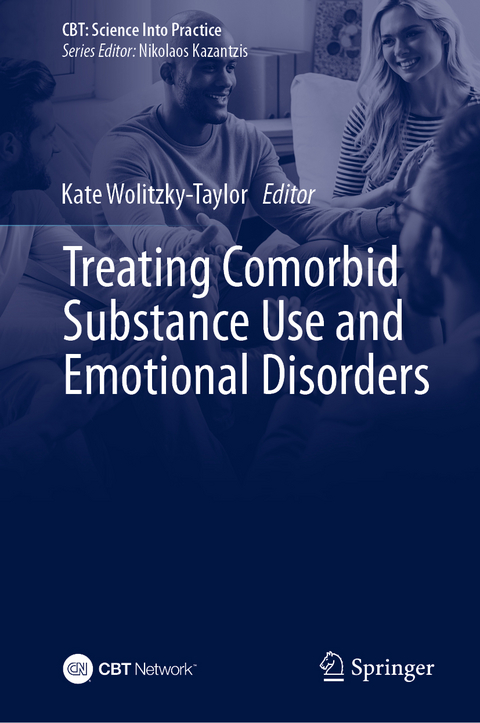
Treating Comorbid Substance Use and Emotional Disorders
Springer International Publishing (Verlag)
978-3-031-62970-9 (ISBN)
This book highlights the prevalence of emotional disorder and substance use disorder comorbidity and effective approaches to managing these co-existing problems. As substance use disorder is twice as likely to co-exist with an anxiety disorder, and three times as likely to co-occur with a mood disorder, treatment is a complicated challenge. This book describes cutting-edge clinical research paired with data-driven treatment guidelines, providing an integrated approach to treatment that targets both issues to improve clinical outcomes. This book outlines how fully integrated treatment for these common comorbidities can address barriers and reduce symptoms more effectively than simply addressing substance use disorder. It is an invaluable resource for clinicians and researchers alike.
Kate Wolitzky-Taylor, Ph.D., is a licensed clinical psychologist and Associate Professor in the UCLA Department of Psychiatry and Biobehavioral Sciences and Semel Institute for Neuroscience and Human Behavior. With over 100 publications and continuous NIH funding for her research since her predoctoral training, she has extensive experience in the development, evaluation, and implementation of cognitive and behavioral therapies (CBT) for anxiety disorder and comorbid substance use disorders (SUD). Her research expertise was developed during her doctoral training in the Laboratory for the Study of Anxiety Disorders at the University of Texas at Austin, where she was funded by the National Institute of Mental Health (NIMH) on a National Research Service Award (F31) to examine the efficacy of self-administered treatments for pathological worry. She then completed her clinical internship at the Medical University of South Carolina, where she was funded on a NIMH training grant (T32) focusing on the research and treatment of trauma-related problems. She then completed a 3-year postdoctoral research fellowship in the Anxiety and Depression Research Center at UCLA, in which she was Project Director of a 10-year, multi-site, NIMH-funded longitudinal study examining common and specific risk factors for emotional disorders. She developed expertise in the nature and treatment of comorbid anxiety and SUD through her Early Career Development Award (K23) funded by the National Institute on Drug Abuse (NIDA), in which she developed and evaluated a CBT program for anxiety disorders to be delivered in SUD specialty clinics to those with comorbid anxiety and substance use disorders. Since then, she has received continuous funding for several NIH-funded studies aimed at developing and evaluating novel behavioral treatments for comorbid anxiety disorders and SUD. In addition to her innovative program of work in the treatment of comorbid anxiety and SUD, for which she received the Sobell Innovative Addictions Research Award from the Association for Behavioral and Cognitive Therapies, she is the Center co-Director for a NIMH-funded ALACRITY Center that aims to optimize a digitally-focused, tiered model of care for anxiety and depression among community college students. In addition to her research, she has an extensive history of providing clinical training and supervision to clinical psychology graduate students, postdoctoral fellows, psychiatry residents, and masters' level clinicians in CBT for anxiety disorders, depression, and comorbid emotional disorders and SUD. Dr. Wolitzky-Taylor also treats patients in the UCLA Faculty Practice, specializing in CBT for anxiety, depression, and comorbid emotional disorder/SUD treatment.
Introduction to the Volume The Case for Integrating Cognitive Behavioral Therapy for Emotional Disorders and Substance Use Disorders.- Cognitive Behavioral Therapy for Social Anxiety Disorder and Alcohol Use Disorder.- Cognitive Behavioral Therapy for Comorbid Cannabis Use Disorder and Emotional Disorders.- Treating Comorbid Major Depressive Disorder and Substance Use Disorder.- Treating Comorbid Posttraumatic Stress Disorder and Substance Use Disorder.- Affect Management Training for Substance Use Disorders A Transdiagnostic Approach to Treating Co-Occurring Emotional Disorder Symptoms and Substance Use.- Smoking Cessation and Anxiety Sensitivity.- Third Wave Behavioral Treatment for Comorbid Substance Use Disorder and Emotional Disorder.- Cognitive Behavioral Therapy for Co-Occurring Anxiety and Opioid Use Disorder in People with Chronic Pain.- Cognitive Behavioral Therapy Targeted to the Successful Discontinuation of Benzodiazepine Medication.
| Erscheinungsdatum | 13.08.2024 |
|---|---|
| Reihe/Serie | CBT: Science Into Practice |
| Zusatzinfo | XVI, 238 p. 10 illus., 2 illus. in color. |
| Verlagsort | Cham |
| Sprache | englisch |
| Maße | 155 x 235 mm |
| Themenwelt | Geisteswissenschaften ► Psychologie ► Klinische Psychologie |
| Schlagworte | addiction • Anxiety Disorders • Behavioral therapy • Cognitive Behavioral Therapy • cognitive therapy • comorbidity • emotional disorders • Integrated Treatment • Mood Disorders • Substance use disorders |
| ISBN-10 | 3-031-62970-1 / 3031629701 |
| ISBN-13 | 978-3-031-62970-9 / 9783031629709 |
| Zustand | Neuware |
| Haben Sie eine Frage zum Produkt? |
aus dem Bereich


